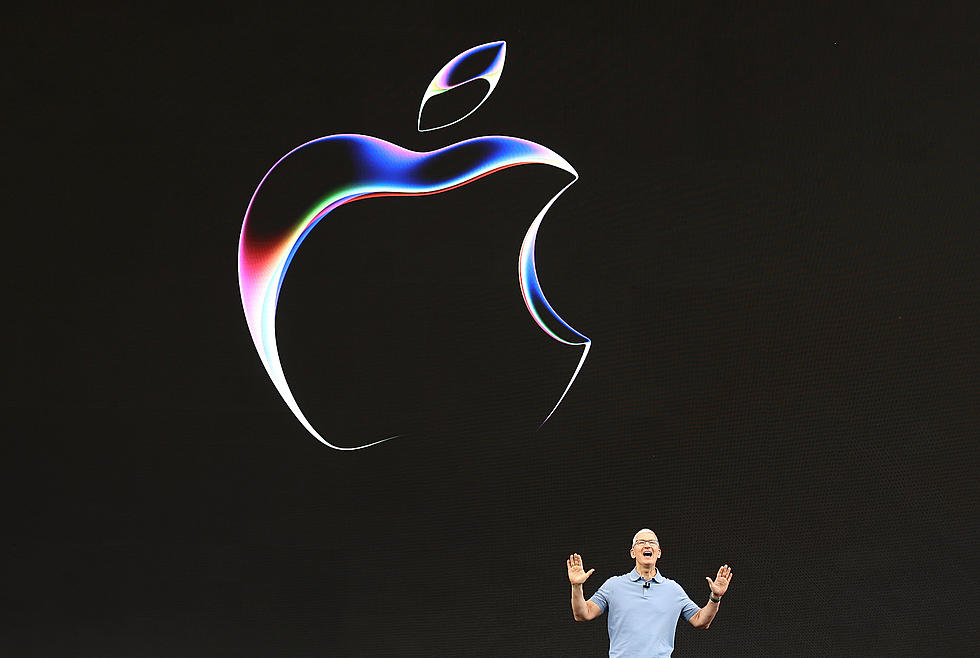
Financial Fruit: Apple Becomes 1st Trillion-Dollar Company
SAN FRANCISCO (AP) — Apple has become the world's first publicly traded company to be valued at $1 trillion, the financial fruit of stylish technology that has redefined what we expect from our gadgets.
The milestone reached Thursday marks the latest triumph of a trend-setting company that two mavericks named Steve started in a Silicon Valley garage 42 years ago.
The achievement seemed unimaginable in 1997 when Apple teetered on the edge of bankruptcy, with its stock trading for less than $1, on a split-adjusted basis., and its market value dropping below $2 billion.
To survive, Apple brought back its once-exiled co-founder, Steve Jobs, as interim CEO and turned to its archrival Microsoft for a $150 million cash infusion to help pay its bills.
If someone had dared to buy $10,000 worth of stock at that point of desperation, the investment would now be worth about $2.6 million.
Jobs eventually introduced popular products such as the iPod and iPhone that subsequently drove Apple's rise. The stock has been surging this week as anticipation mounts for the next generation of iPhone, expected to be released in September.
Apple hit the $1 trillion mark when its shares reached $207.04 around midday in New York. They rose to an all-time high of $208.32 before falling back slightly. The shares are up around 23 percent so far this year.
Another company, Saudi Arabian Oil Co. could eclipse Apple if it goes through with plans for an initial public offering. Saudi officials have said the IPO would value Saudi Aramco, as the company is often called, at about $2 trillion. But until the IPO is completed, Saudi Aramco's actual value remains murky.
Jobs' vision, showmanship and sense of style propelled Apple's comeback. But it might not have happened if he hadn't evolved into a more mature leader after his exit from the company in 1985. His ignominious departure came after losing a power struggle with John Sculley, a former Pepsico executive who he recruited to become Apple's CEO in 1983 — seven years after he and his geeky friend Steve Wozniak teamed up to start the company with the administrative help of Ronald Wayne.
Jobs remained mercurial when he returned to Apple, but he had also become more thoughtful and adept at spotting talent that would help him create a revolutionary innovation factory. One of his biggest coups came in 1998 when he lured a soft-spoken Southerner, Tim Cook, away from Compaq Computer at a time when Apple's survival remained in doubt.
Cook's hiring may have been one of the best things Jobs did for Apple. In addition, that is, to shepherding a decade-long succession of iconic products that transformed Apple from a technological boutique to a cultural phenomenon and moneymaking machine.
As Jobs' top lieutenant, Cook oversaw the intricate supply chain that fed consumers' appetite for Apple's devices and then held the company together in 2004 when Jobs was stricken with a cancer that forced him to periodically step away from work — sometimes for extended leaves of absences. Just months away from his death, Jobs officially handed off the CEO reins to Cook in August 2011.
Although Apple has yet to produce another mass-market sensation since that changing of the guard, Cook has leveraged the legacy that Jobs left behind to stunning heights. Since Cook became CEO, Apple's annual revenue has more than doubled to $229 billion while its stock has quadrupled.
More than $600 billion of Apple's current market value has been created while Cook has been CEO. That wealth creation exceeds the current market value of every publicly traded U.S. company except Amazon, Microsoft and Google's parent, Alphabet.
Even so, Cook has encountered criticism, chiefly for the creative void left in Jobs' wake. The Apple Watch has been the closest thing that the company has had to creating another mass-market sensation under Cook's leadership, but that device hasn't come close to breaking into the cultural consciousness like the iPhone or the iPad.
That has raised concerns that Apple has become far too dependent on the iPhone, especially since iPad sales tapered off several years ago. The iPhone now accounts for nearly two-thirds of Apple's revenue.
But Cook has capitalized on the continuing popularity of the iPhone and other products invented under Jobs' reign to sell services tailored for the more than 1.3 billion devices now powered by the company's software.
Apple's services division alone is on pace to generate about $35 billion in revenue this fiscal year — more than all but a few dozen U.S. companies churn out annually.
Apple had also come under fire as it accumulated more than $250 billion in taxes in overseas accounts, triggering accusations of tax dodging. Cook insisted what Apple was doing legal and in the best interest of shareholders, given the offshore money would have been subjected to a 35 percent tax rate had if it were brought back to the U.S.
But that calculus changed under the administration of President Donald Trump, who pushed Congress to pass a sweeping overhaul of the U.S. tax code that includes a provision lowering this year's rate to 15.5 percent on profits coming back from overseas.
Apple took advantage of that break to bring back virtually all of its overseas cash, triggering a $38 billion tax bill. All that money coming back to the U.S. also spurred Apple to raise its dividend by 16 percent and commit to buy back $100 billion of its own stock as part of an effort to drive its stock price even higher.
More From Newstalk 1290









